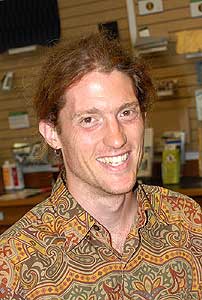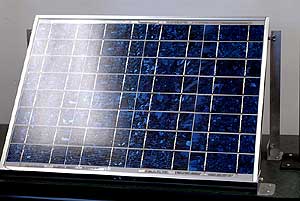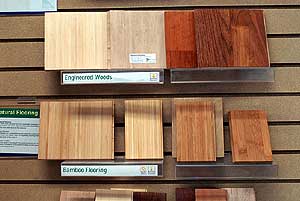Living Green in the D
Jacob
Corvidae is a man with a plan, and he wants Detroiters thinking green.
He’s the first subject in a series looking at the push for eco-friendly
living and sustainable development in the D.
This is the first in a monthly series in which Model D will explore green thinking in the Motor City.
In a city lacking even curbside recycling, let alone a citywide “green plan” (i.e., Chicago or Portland),
it can be difficult to see the forest for the trees when it comes to
sustainable development. After all, it sometimes seems like any
development at all (think big box) is lauded and applauded — which is
quite understandable.
But this very vacuum — as dictated by the
laws of physics — has created opportunity. And Detroiters, intrepid as
always, have found unique, creative, and often uncharted ways to fill
that vacuum.
This is the first in a series of articles in which
Model D will look at those who are filling the void, and bringing green
thinking to the Motor City.
Man with a plan
 Jacob
Jacob
Corvidae has a vision that ranges from the personal — like his choice
to raise his family in North Corktown — to citywide — namely, his work
with WARM Training Center.
Corvidae, like many of his activist
peers, subscribes to the mantra that the personal is political and to
that end hosts monthly gatherings at his crib, charmingly named The
Crow’s Nest. A few of the many projects — all in various stages of
execution — nurtured at these EcoVillage Potlucks include Motor City CarShare, Detroit Co-Housing
and the new monthly Corktown Garden Market. His home also serves as the
Detroit drop-off/pick-up point for Maple Creek Farm’s community
supported agriculture program, an organic co-op located in the Thumb that provides its members with fresh produce weekly from spring through fall.
Starting
from this foundation, it is no surprise that Corvidae isn’t the type to
work a typical cash-oriented 9-to-5. His job as Green Programs Manager
at WARM Training Center means that he works to promote “green” building
in Detroit, a challenge considering the numerous incentives already
necessary to make development happen at all in this still-imperfect
market.
Energy efficient is affordable
WARM’s
mission is to promote affordable, sustainable housing. It provides
education to both the public and development-minded organizations. “Our
history and base is as a community development organization, which is
excellent in (getting us into) grassroots, on-the-street-programming,”
he says. Or in other words: Those who have done now teach.
 In
In
2005, WARM provided energy efficiency classes to more than 3,000 people
— primarily low income — in the Detroit area, arming individuals with
solid information that empowers them to make small changes to their
homes that make big impacts. “There are more than ‘green’ reasons (to
do this),” Corvidae stresses. “There is a social impact, like in
preventing homelessness, and giving people more money for medical
bills, better housing and higher education.”
Through a
partnership with United Way’s Non-Profit Facility Center, WARM also
provides other nonprofit organizations with sustainability audits that
advise these often cash-strapped entities how to renovate their
buildings — or build new ones — with an eye towards healthier indoor
air quality and more renewable energy systems, as well as on the use of
practices and materials that are better for the environment. This
program, geared towards service-providers such as group homes and
homeless shelters, aims to help organizations spend their
already-limited operating funds on better things than costly utility
bills.
One success story is involves JARC,
an organization located in Farmington Hills that provides assistance to
developmentally disabled individuals and the organizations that help
them. When JARC implemented the recommendations of a WARM
sustainability audit, the organization saved $30,000 on utility bills
in one year — enough to hire a new staff person. “It’s that much more
capacity to fulfill their mission, and it allows them to provide better
services to their constituents,” Corvidae says.
 WARM is also
WARM is also
stretching beyond its grassroots roots to provide technical assistance
to builders and the general public, no matter their income level, to
educate them about the advantages of green building and energy
efficient homes. This can be tough, as any and all energy efficient
measures in Michigan are currently voluntary, but they can also be
valuable, he says. “Granite countertops are not the only thing to look
for in a house! Energy efficiency can affect (a house’s) durability and
resale value.”
Ever an optimist, Corvidae does not point a
finger at the state’s building code, which currently ranks 10th from
the bottom nationally in terms of energy code requirements. Instead he
focuses on spreading knowledge. “The information is out there, we’re
not inventing this information. The key is finding good programs to
inspire people to use this information.”
Would incentives entice
a bottom-line builder to go green? Corvidae believes so, but only in
the short term. “You can’t rely on incentives. Financial incentives get
it moving, but there needs to be a much wider marketing campaign to get
the word out. (People) understand value. Once consumers are demanding
it, builders will need to meet that demand — and not just commercial
developers, but lenders, realtors and architects.”
The big green picture
 WARM’s
WARM’s
task is not an easy one, in part because many Detroiters need to get
basic needs met first, Corvidae says. “You have to deal with starvation
before air quality. (Basic need) preempts a lot of this work, which is
why Detroit has not made more progress on this.” But — here’s where the
vacuum theory comes in — he also sees this as an “opportunity to do it
better.”
More affluent cities have already made bigger strides
towards true sustainability, but Corvidae says Detroit will have the
benefit of learning from their decades of trial and error. “There is a
notion that sometimes, to come in a little later is better (because you
get to use) newer technology. In a similar way, Detroit can build a
sustainable city for the 21st Century. In redeveloping, in rebuilding,
we can mold a vision that takes advantage of wasteland and build
sustainable communities instead of recreating suburbs that are already
an outdated mode.”
Corvidae’s basic mantra of sustainable
building for the masses is an inspiring one: “There is a myth, a
perception, in the general public that environmental sustainability is
an elite luxury — and you see this borne out around the country. We
have an opportunity to apply these same concepts in a more diverse
working class set of cultures and environment. Detroit can be a great
proving ground for how sustainability need not be an elite upper class
luxury — that it can be built into all levels of society.”
Visit http://www.sustainabledetroit.org/ and http://www.warmtraining.org/ for more information.
Photos:
Habitat for Humanity Homes in the Core City Neighborhood are Energy Star Certified
Jacob Corvidae
Solar Panel, Flooring and Insulation Samples at WARM
Photographs Copyright Dave Krieger




